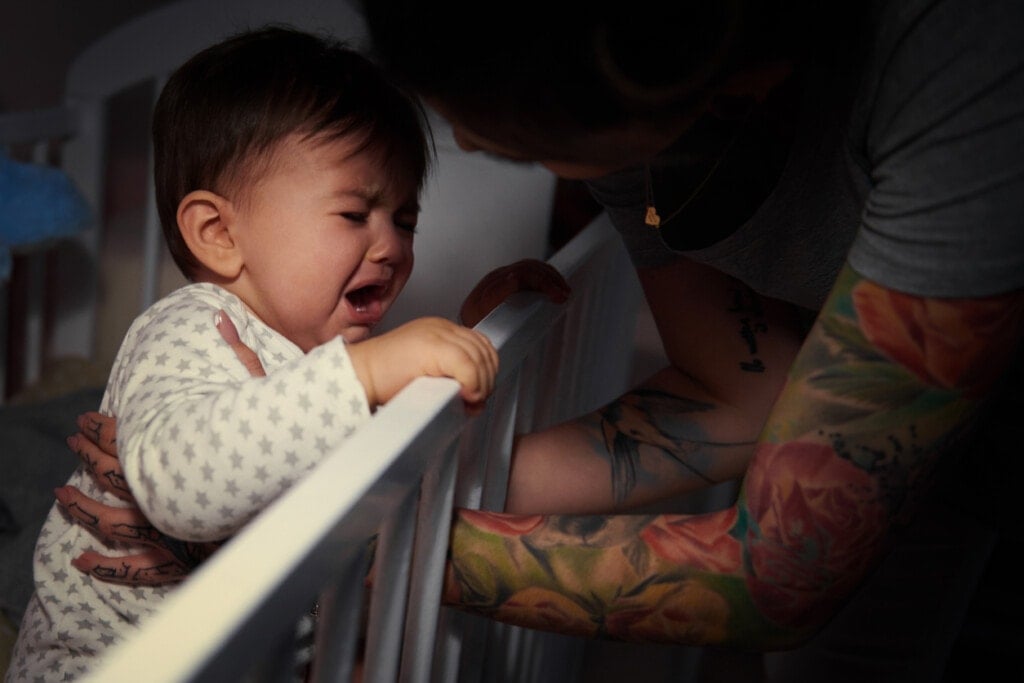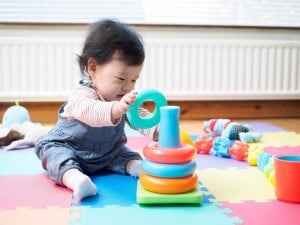As a parent, it’s distressing when your baby wakes up screaming or crying hysterically, whether from naps or in the middle of the night. You want to comfort and soothe them, but figuring out what’s wrong isn’t always easy. There’s no one-size-fits-all answer for why babies wake up crying, but several common causes—like separation anxiety, sleep cycles, inability to self-regulate, or physical discomfort—can lead to inconsolable crying, especially in babies and toddlers.4,5,6 While you might not always know the exact cause of your baby’s tears during wakeups, there are some common reasons to consider.
5 Reasons Your Baby or Toddler Might Wake Up Screaming or Crying
Here are a few reasons why your child might wake up crying or screaming at night and what you can do about it:
1. Sleep Cycles
From birth, your baby will spend time going in and out of sleep cycles, which will evolve. By the time your baby is around 3 months old, they should start to develop a rhythm for sleep both during the day and at night.1,2 For some, especially newborns and infants, transitioning between sleep cycles may cause them to wake up crying before they’re fully awake, unable to self-soothe back to sleep. During this time, they will have periods of light sleep where they can easily wake or become startled. This could cause them to cry or even scream. Similarly, babies (and even older children) may be awakened suddenly during deep sleep, which could also result in crying or screaming.7
What To Do
One reason we suggest using white noise for naps and night sleep is to prevent your baby from being woken up and startled by loud noises.8 The steady white noise also helps provide babies with consistency as they transition sleep cycles. Babies sometimes become upset when they realize a parent isn’t in the room. Then, they may need help getting back to sleep.
If your baby wakes up crying in the middle of the night, give them a few moments before going in. Observe and listen while you wait. Once it’s clear you need to intervene, aim to comfort your baby and help them get back to sleep in a way they respond to best. This might mean rocking them, patting their bum, rubbing their head, nursing them, etc.
2. Separation Anxiety
As your baby gets older, they become more aware of their surroundings and dynamics. Separation anxiety is a common reason why babies wake up crying, especially between 6–18 months when object permanence is developing. Your little one should realize when you are or aren’t in the room with them. This awareness, also called object permanence, usually develops around the six-month milestone. And it can progress to separation anxiety once your child is 12 months or older.3,9,10
For small children, the idea that their parents are far away can be frightening. This prevents them from calming down and returning to a blissful night of slumber.11
What To Do
One way to teach your child that people are still around — even if they can’t see them — is through games that promote object permanence, such as peek-a-boo. You can also practice hiding their toys under a blanket and revealing them a few seconds later.9 Make sure to do this during the day, not at night. Object permanence teaches a child that something still exists, even if it’s out of their view.9 If your child has actual separation anxiety, comforting them, lovingly drawing boundaries, and helping your child learn coping strategies are crucial.
3. Developmental Milestones
Most parents have heard that their little ones will have some sleep regressions as milestones come and go, but they don’t expect it to be so hard. Sleep regressions are progressions as your child grows.4 These are likely to occur around the 4-, 6-, 8-, 12-, 18-, and 24-month marks.5,11 The reason your child is likely hitting a new milestone at each of these ages might be the ability to roll over, crawl, stand up, and more.5
Whether your 1-year-old wakes up screaming inconsolably or your newborn wakes up crying after a nap, milestone transitions can be a disruptive factor.
What To Do
When your child experiences a sleep progression or regression, the best thing you can do is stick to the things you know work. Ensure they’re comfortable, create a good sleep environment (cool and dark), and maintain consistency in their routine.4,5 Depending on your child’s age, you might find support in our guides to must-have baby sleep products for 0–6 months and sleep must-haves for 6-12 month olds to create a cozy, restful space.
It’s always okay if you need to offer a bit more soothing, snuggles, or comfort during this time. But you want to avoid creating completely new routines or habits that aren’t sustainable long-term.
4. Physical Discomfort
With growth spurts, teething, or even an infection that may be brewing, physical discomfort can start early in our kiddos. Be sure to check for a fever and pay close attention if they’re tugging on body parts such as the nose or ears.11
If your baby wakes up screaming from naps or cries suddenly in the night, teething, gas, or illness could be the reason.
What To Do
If you think your child may be physically uncomfortable, consider offering them pain relief through approved medications from your healthcare provider. Or you can try treating them holistically. If your child struggles with nasal congestion or illness, you can run a humidifier and try to suction out their clogged nose, which keeps them from breathing comfortably.12
5. Hunger
In the first few months of life, your baby will likely wake up hungry in the middle of the night and cry. Some little ones wake up so hungry that they begin to cry hysterically.11 A newborn who wakes up screaming may be reacting to hunger or a disrupted feeding routine. Later, this may be true if you’ve just stopped their bedtime feeds or weaned them from some feedings in favor of solid food or purees.
What To Do
This dilemma can be tricky, but there are ways to tackle it. If your little one is hysterical at night because they’re hungry, try to supplement their mealtimes during the day if you think they aren’t getting adequate calories. It’s common for babies to wake up one to two times between 6 and 12 months and need a night feed, and it’s completely fine to offer that.13
How to Prevent Your Child From Waking Up Screaming or Crying
If you want to prevent these distressing nighttime awakenings for both of you, there are some key things you can try. While you may not be able to completely prevent situations where your baby wakes up crying or your 2-year-old wakes up screaming inconsolably, a consistent routine and calming environment can help reduce the frequency. But remember, you can’t completely prevent this from happening.
First, make sure your baby is as comfortable as possible. Then, determine if an environmental trigger, like light shining through the curtains, is causing them to wake up at night. They might be too hot or cold, have a wet diaper, or be in pain from teething or growth spurts. All these issues are common reasons why your little one might be waking up.11 Eliminating these challenges can be the first step to getting your baby comfortably back to sleep after they wake up crying or screaming in the middle of the night.
We hope these tips help you and baby get better rest at night! If you need help getting your child to self-soothe and eliminate middle-of-the-night wakeups, consider getting help from a sleep consultant. A professional who’s experienced in this area can give you personalized support to pinpoint why your child is waking up and determine what exact steps to take.



































